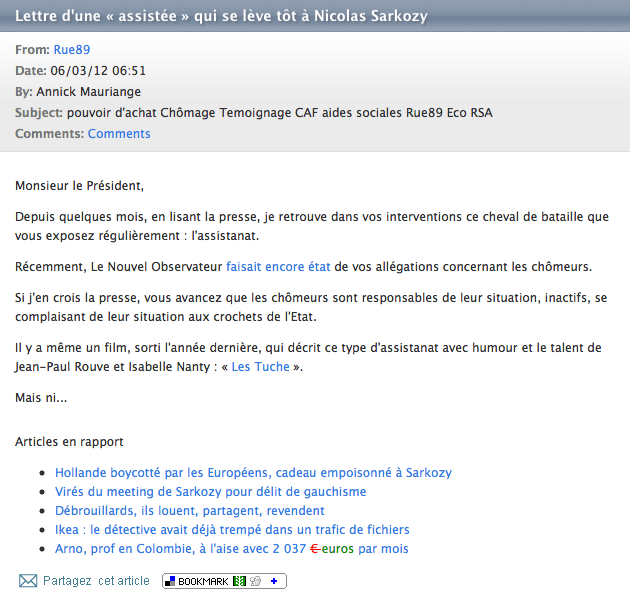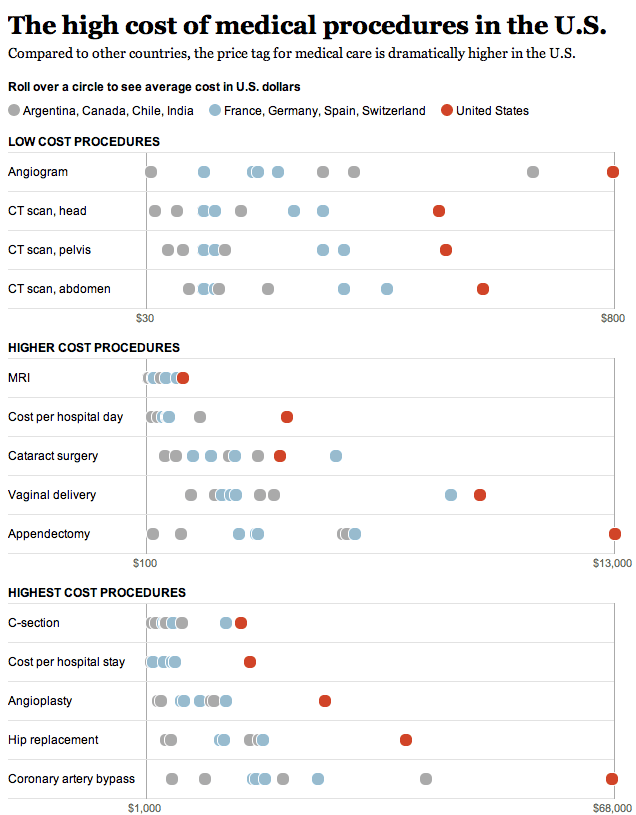#coupdegueule
Deux médias que je ne suivrai plus. Ce qui libèrera du temps pour d’autres, plus attentionnés pour leur public.
La raison ? Des fils RSS nuls.
Ces deux médias ont implanté dans leurs RSS une fonction “articles en rapport”. Comme les “articles en rapport” changent souvent (selon une logique qui m’échappe un peu), les vieux items du flux sont mis à jour et apparaissent comme nouveaux.
Génial ! Comment tuer la principale fonction d’un flux RSS qui consiste à signaler ce qui est nouveau, puisqu’à chaque rafraîchissement, tout est à nouveau nouveau (ou presque).
Mais là où ça devient totalement crétin, c’est que les articles en rapport n’ont aucun rapport. Cette fonction ne sert à rien, sinon à vous empoisonner votre agrégateur
Exemple avec Libération, pour cet article.

D’ailleurs, ils vous méprisent tellement chez Libé, qu’il n’y a rien dans le RSS, zéro chapeau, zéro début d’article. Et comme la moitié des titres dans le style propre à Libé ne permettent pas de deviner de quoi l’article parle vraiment…
Chez Rue89, on a au moins la courtoisie de donner un début d’article. Mais, il a toujours le problème des “articles en rapport”…

Le point commun entre Libé et Rue89 ? Ils ont délégué la gestion de leurs flux XML à Mediafed.
Si vous gérez un site d’info et que vous voulez, vous aussi, perdre des lecteurs, ça me semble être une bonne piste.
I think this physical archive of printed books is an essential project as we complete our transition into the digital age. I wonder if the concept could be taken a step further by creating a globally-distributed archive that is run by a network of volunteers. The latter would avoid a possible Library of Alexandria outcome.
The image of the books and photographs that have been stored in my own grandparent’s house for over 60 years in excellent condition is a suggestive. In that vein, I am envisioning a network of volunteers who could register the contents and location of their own personal collections, checking-in and updating the registry every few years. Such a registry would formalize the informal system of impassioned book collectors that already exists throughout the world. It would be less controlled than the Internet Archive’s centralized archive to be sure, but it would have the advantages of being geographically distributed, containing multiple copies of any single work, and run with little or no cost. Volunteers could also take on the responsibility of acquiring books that are rare or missing from the registry, in an effort to make sure the collection remains complete over the centuries ahead. I think combining this informal, distributed collection with a the centralized archives like the Internet Archive and major libraries would be a great combination for keeping our written culture safe and sound for posterity.
Comment from Adam Whitney, on Internet Archive Blogs: “Why Preserve Books? The New Physical Archive of the Internet Archive.”
Quand le privé l’emporte sur le public, quand la santé devient un business très juteux. Le douloureux (et coûteux) exemple américain. Encore une fois, la France fait figure de mètre étalon en la matière. Pour combien de temps ?

There is a simple reason health care in the United States costs more than it does anywhere else: The prices are higher.
That may sound obvious. But it is, in fact, key to understanding one of the most pressing problems facing our economy. In 2009, Americans spent $7,960 per person on health care. Our neighbors in Canada spent $4,808. The Germans spent $4,218. The French, $3,978. If we had the per-person costs of any of those countries, America’s deficits would vanish. Workers would have much more money in their pockets. Our economy would grow more quickly, as our exports would be more competitive.
There are many possible explanations for why Americans pay so much more. It could be that we’re sicker. Or that we go to the doctor more frequently. But health researchers have largely discarded these theories. As Gerard Anderson, Uwe Reinhardt, Peter Hussey and Varduhi Petrosyan put it in the title of their influential 2003 study on international health-care costs, “it’s the prices, stupid.”
WonkBlog, Ezra Klein: “Why an MRI costs $1,080 in America and $280 in France”.





Blah ? Touitter !